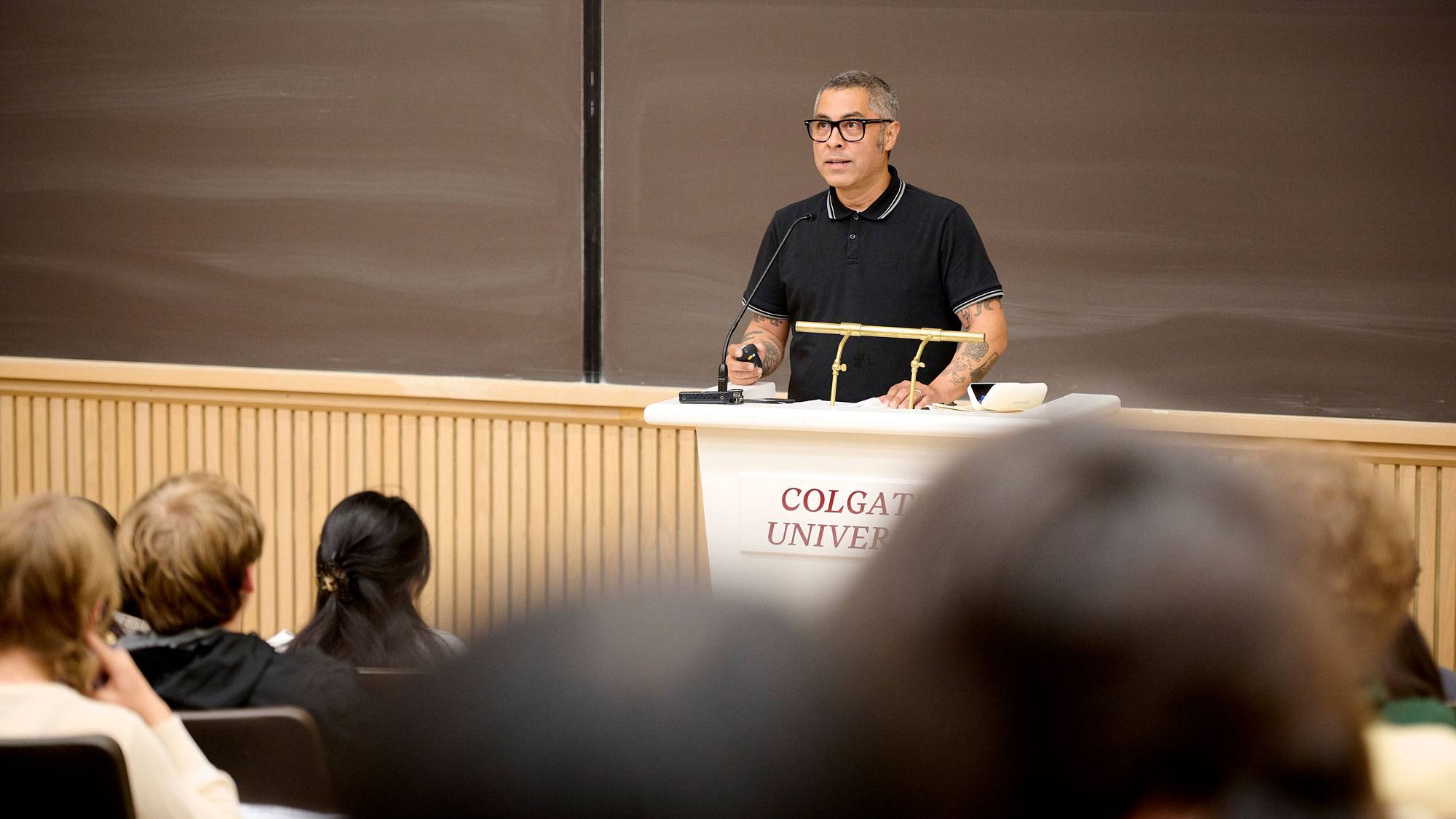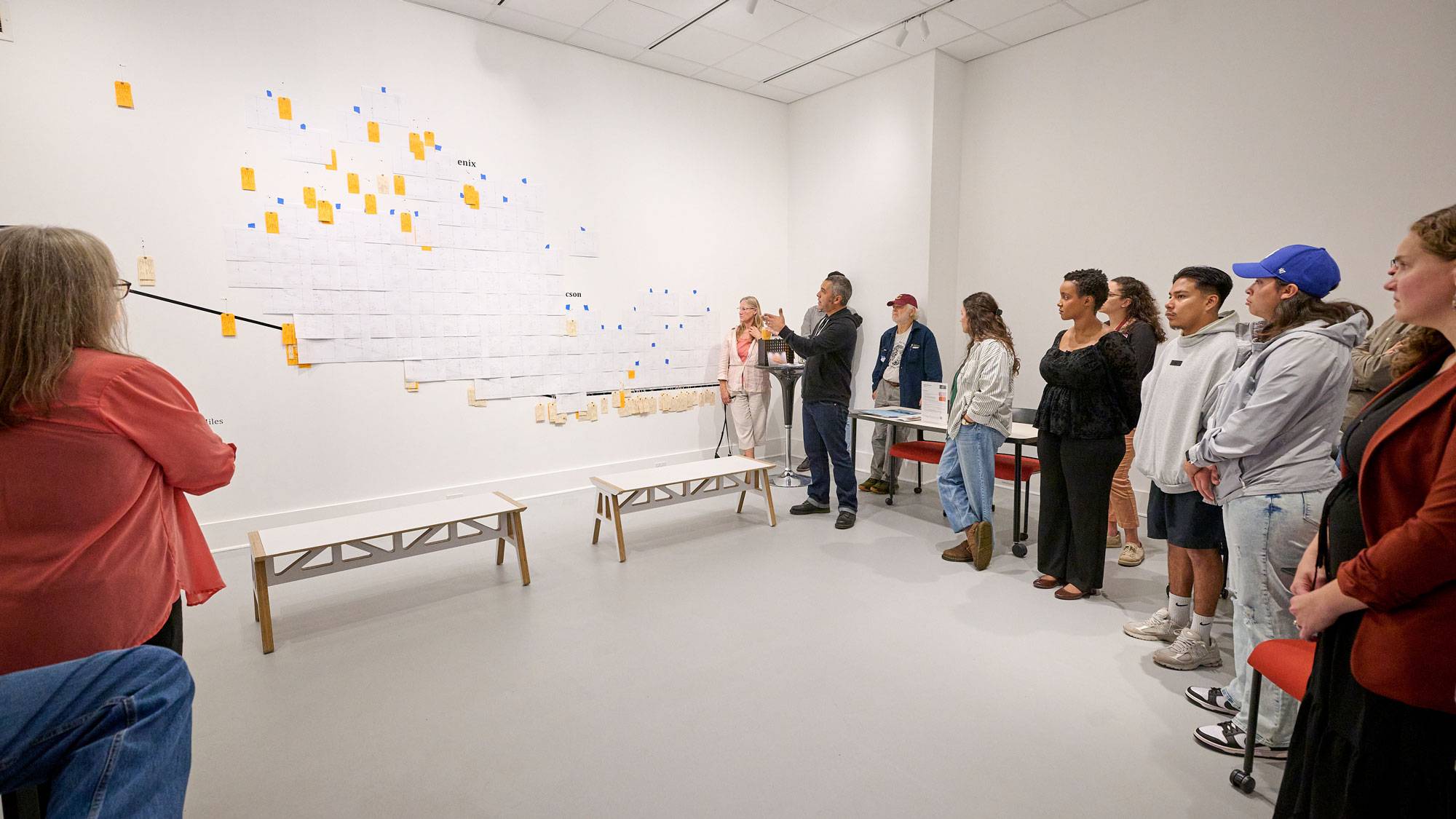At a time when immigration is a focus of intense international attention, archaeologist Jason De León came to campus Sept. 25–26 to deliver the Peter C. Schaehrer ’65 Memorial Lecture and to open an exhibition centered on his studies of undocumented migration by people seeking refuge in Mexico and the United States.
For his 2024 National Book Award-winning Soldiers and Kings: Survival and Hope in the World of Human Smuggling, De León spent five years in the field interacting with young smugglers who were scratching out a meager, dangerous living by helping migrants traverse Mexico from the south to the U.S. border. Predatory gangs and cartels make that journey increasingly dangerous. De León’s ethnographic study — which he describes as “deep hanging out,” or “learning about people by observing and participating in their lives” — informs the narrative for his book, much of which is told in the words of the half dozen smugglers (also characterized as guides or “coyotes”) with whom he formed his closest relationships.
His illustrated lecture to a packed Love Auditorium drew on the book, with De León reading passages, expanding on their circumstances, and making connections to broader immigration issues and policies. He also shared images and text from a section that he cut from an early draft of the book (“the B side,” said the one-time touring musician).
Prior to Soldiers and Kings, De León won the Margaret Mead Award from the American Anthropological Association for his 2015 book The Land of Open Graves: Living and Dying on the Migrant Trail. That book is based on his study of the death and suffering of migrants attempting to cross Arizona’s Sonoran Desert. His continuous study of immigration policy dates from the administrations of Bill Clinton, George Bush, and Barack Obama forward.
Where De León’s research for The Land of Open Graves did not include extensive interaction with smugglers, he told his Colgate audience that the research for Soldiers and Kings “forced me to approach immigration differently.” In the book’s introduction, he wrote: “I begin this book with the seemingly radical proposition that those who try to make a living guiding people across hardening geopolitical boundaries are themselves human.” Responding to a question at his lecture, De León called his access to the smugglers “a gift these men and women gave to me. I was in the privileged position of being told these stories to help make the world understand.”
De León clearly distinguishes between the smuggler/guides who provide a service by helping migrants navigate the dangerous terrain, and the traffickers and kingpins who exploit and prey on the helpless and uninformed.
Recipient of a MacArthur Foundation “genius” Fellowship, De León is professor of anthropology and Chicana/o and Central American studies at UCLA, where he holds the Lloyd E. Cotsen Chair in archaeology and directs the Cotsen Institute of Archaeology. He is also the executive director of the Undocumented Migration Project (UMP), a nonprofit research, arts, and education collective raising awareness about migration issues globally.
UMP created the interactive exhibition Hostile Terrain ’94, the latest installation of which opened at Colgate’s Longyear Museum of Anthropology on Sept. 26. At the opening, De León described the evolution of the project, which has traveled nationally and internationally to nearly 150 locations since 2019.
Hostile Terrain ’94 comprises more than 4,000 handwritten toe tags arrayed on a map of the Arizona/Mexico border, geolocating where migrants died trying to cross the Sonoran Desert between the mid-1990s and 2024. Local volunteers are enlisted to inscribe the toe tags, which staff add to the map throughout the exhibition. The Longyear Museum in Colgate’s Alumni Hall is open to the public. The exhibition will remain open until March 2026, and community members are encouraged to participate in the completion of the memorial.
De León’s visit to Colgate was organized by the Peace and Conflict Studies Program (PCON) and the Longyear Museum and is part of the fall event series “Undocumented Migration into a Hostile America.” Fourteen other Colgate departments and programs joined PCON and Longyear to sponsor his appearance.
De León’s lecture was the 16th annual Schaehrer Lecture, sponsored by Schaehrer’s classmates, several of whom attended the lecture, the exhibition opening, and a question-and-answer seminar with De León on Sept. 26.
That seminar, held over an informal breakfast, offered a more intimate opportunity for students and others to press De León for insights on his work, his writing, and issues affecting immigration. To understand the complexity of migration, said Hunter Moss ’26, a double major in peace and conflict studies and Russian and Eurasian studies, “It helps to have the author here.”

